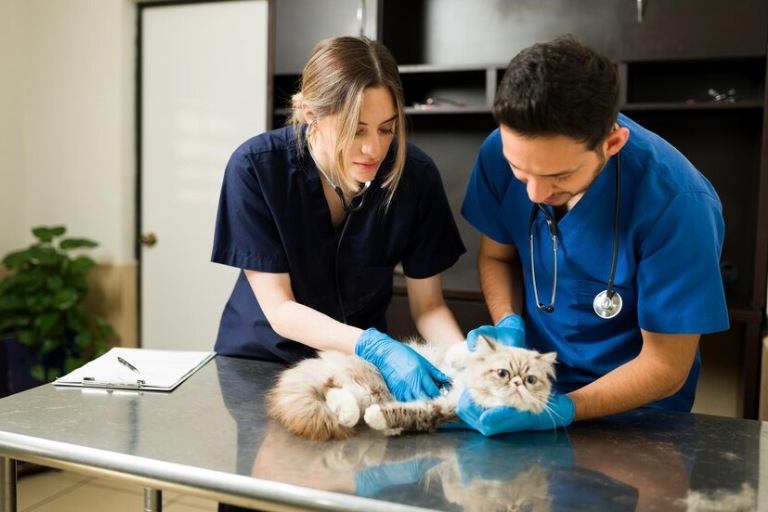Call Us TODAY: +91 6291298965

Dog/Cat Surgery: A Comprehensive Guide
At MediVets, we understand that your pet’s health and well-being are your top priority. When your cat requires surgery, it can be a stressful and overwhelming time, both for you and your furry friend. We are committed to providing compassionate care and ensuring that your pet receives the best possible treatment in a safe, comfortable, and loving environment. In this guide, we will explore everything you need to know about cat surgery, including what to expect, the types of surgeries available, and how you can help your pet recover effectively.
What Is Pet/Cat Surgery?
Pet surgery refers to any medical procedure performed on your cat that involves an incision in the body to treat a health condition, repair damage, or improve the pet's overall health. Surgery may be necessary for a variety of reasons, including injury, illness, or congenital conditions. At MediVets, we offer a range of surgical services to cater to the diverse needs of our feline patients, from routine spaying and neutering to more complex procedures.
Types of Cat Surgeries
-
There are many different types of surgeries that your cat may need, depending on their specific health condition. Some of the most common surgeries performed on cats include:
1. Spaying and Neutering
Spaying (for females) and neutering (for males) are routine surgeries performed to prevent unwanted pregnancies and reduce the risk of certain health problems, such as uterine infections or testicular cancer. These surgeries are typically done when cats are around six months of age.
2. Dental Surgery
Cats can suffer from dental issues, including tooth decay, gum disease, and oral infections. Dental surgery may be required to remove infected teeth, clean the gums, or perform other necessary treatments to ensure your cat's oral health.
3. Soft Tissue Surgery
This category includes a wide variety of procedures, such as removal of tumors, treatment of abscesses, or repair of internal injuries. Soft tissue surgeries are often performed to treat conditions like cancer, infections, or trauma.
4. Orthopedic Surgery
Orthopedic surgery is required when a cat has fractures, joint problems, or ligament injuries. These surgeries may involve the repair of broken bones, joint stabilization, or the correction of congenital deformities.
5. Cataract Removal
Cataracts are a common cause of vision loss in cats. If your cat is experiencing significant vision impairment due to cataracts, surgery may be recommended to remove the cloudy lens and restore their sight.
6. Emergency Surgery
In some cases, cats may require emergency surgery due to traumatic injuries, ingestion of toxic substances, or sudden medical conditions like bloat or intestinal obstruction. Emergency surgeries are critical to saving the life of a pet in distress.
Preparing for Your Cat’s Surgery
Before your cat undergoes surgery, it’s important to follow specific instructions from your veterinarian to ensure a successful procedure and smooth recovery. Here’s what you can expect:
-
Pre-Surgical Examination Your vet will conduct a thorough physical examination of your cat to ensure they are healthy enough for surgery. This may include blood tests, imaging (such as X-rays), and other diagnostic procedures. If your cat has any underlying health conditions, these may need to be addressed prior to surgery.
-
Fasting Most surgeries require your cat to fast for 12-24 hours before the procedure. This ensures that your cat’s stomach is empty during the surgery, reducing the risk of complications related to anesthesia.
-
Anesthesia During the surgery, your cat will be put under general anesthesia to keep them comfortable and pain-free. The anesthesia used at MediVets is safe and closely monitored to ensure your cat’s well-being throughout the procedure.
-
Pre-Surgical Medications Depending on the surgery type, your vet may administer antibiotics or pain medications to prepare your cat for the procedure and minimize the risk of infection or discomfort.
After-Surgery Care
Once your cat has undergone surgery, proper aftercare is essential for a successful recovery. Here are some key things to keep in mind:
-
Recovery Room After surgery, your cat will be taken to a recovery room where they will be closely monitored as they wake up from anesthesia. The team at MediVets will ensure your cat’s vitals are stable and provide any necessary pain relief.
-
At-Home Care You’ll be given instructions on how to care for your cat once they return home. This may include managing their pain with prescribed medications, keeping their incision site clean, and limiting their activity to allow for proper healing.
-
Follow-Up Appointments MediVets will schedule follow-up appointments to monitor your cat’s recovery and remove sutures if necessary. Regular checkups are important to ensure that your cat is healing as expected and that there are no complications.
-
Signs of Complications While most cats recover well from surgery, it’s important to keep an eye out for any signs of complications. These can include:
-
Swelling or redness at the incision site
-
Discharge or bleeding
-
Loss of appetite or lethargy
-
Excessive licking or biting at the incision If you notice any of these signs, contact MediVets immediately for advice or assistance.
-


